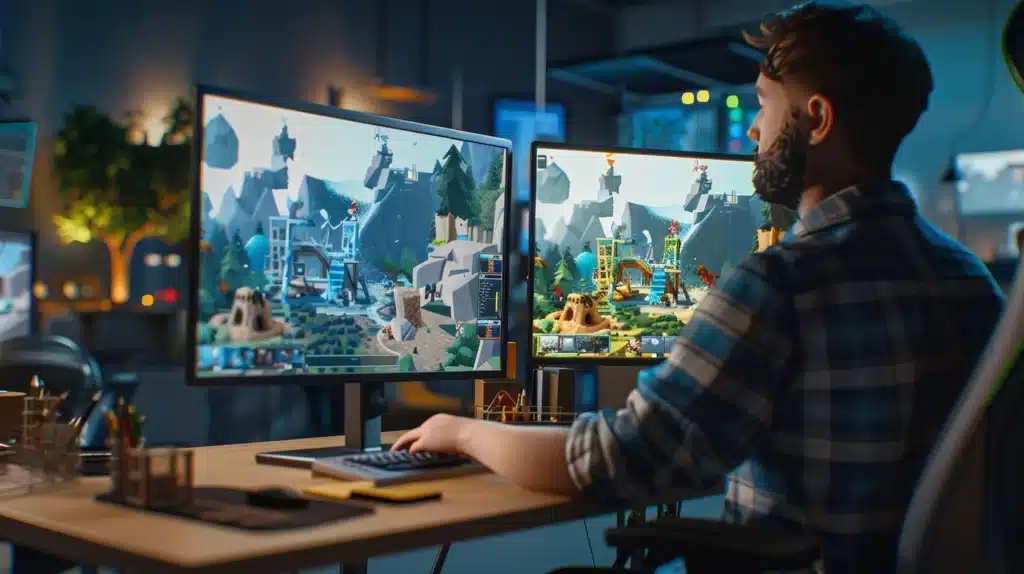The world of gaming has been revolutionized by the advent of artificial intelligence (AI), transforming everything from gameplay mechanics to player interactions. As technology advances, AI has become an integral part of modern games, offering new levels of immersion and complexity. This article explores the depth of AI’s impact on gaming and how it shapes the experiences of players across the globe.
Enhancing Realism and Immersion
One of the most significant contributions of AI to modern gaming is the enhancement of realism and immersion. AI has enabled developers to create more lifelike non-playable characters (NPCs) that react dynamically to the player’s actions. These NPCs can adapt to different situations, providing a more authentic and engaging experience for players. For example, in open-world games, AI-driven characters behave in ways that mimic real-life behavior, such as engaging in daily routines, responding to player interactions, and displaying emotions.
Dynamic Game Environments
AI is also responsible for creating dynamic game environments that respond to player choices. This capability allows for a unique gaming experience every time, as AI algorithms adjust the game world based on player actions. Have you ever wondered why each playthrough of a game like “The Elder Scrolls V: Skyrim” feels different? That’s AI at work, generating responsive environments that keep players engaged and invested in the storyline.
Personalized Gaming Experience
Artificial intelligence is taking personalization in gaming to new heights. Through machine learning algorithms, games can now analyze player behavior and tailor content to suit individual play styles. This personalization can include adjusting the difficulty level dynamically, recommending strategies, or even altering story arcs to better fit the player’s decisions. This means that each player’s journey is uniquely their own, crafted by AI to match their preferences and skills.
Adapting to Player Skills
Adaptive AI in games can assess a player’s skill level and modify challenges accordingly. This ensures that players remain engaged, neither overwhelmed by difficulty nor bored by ease. For instance, a racing game might adjust the AI competitiveness based on the player’s performance, offering a balanced challenge that keeps the game enjoyable.
Revolutionizing Game Development
AI is not only transforming the gameplay experience but also revolutionizing the way games are developed. Game designers use AI tools to streamline the creation process, from generating complex landscapes to scripting intelligent NPC behaviors. This technology saves time and resources, allowing developers to focus on creativity and innovation.
Procedural Content Generation
AI-driven procedural content generation is becoming a staple in game development. This technique uses algorithms to automatically create game content, such as levels, maps, and quests, reducing the need for manual creation and expanding the possibilities for vast game worlds. The AI-generated content ensures that no two game experiences are identical, providing endless replayability for players.
AI in Competitive Gaming
The rise of eSports and competitive gaming has also benefited from AI. From matchmaking systems that pit players of similar skills against each other to anti-cheat algorithms that ensure fair play, AI is crucial in maintaining the integrity of competitive gaming environments. It helps create a balanced and enjoyable experience for all participants.
Fair Competition and Matchmaking
AI-driven matchmaking systems analyze various factors to pair players with similar abilities, ensuring fair competition and enhancing the overall experience. These systems use data such as past performance, play style, and win/loss ratios to create balanced matches. This approach keeps players engaged and encourages skill development over time.
In-Game Economies and AI
Artificial intelligence also plays a significant role in managing in-game economies. Complex algorithms monitor and adjust virtual economies to maintain balance and fairness. This is particularly evident in games with currency systems where players can purchase items or upgrades. For instance, consider how virtual currency dynamics influence gameplay strategies. In games like EA FC25, https://usabusinesshub.blog/ can offer players the opportunity to unlock unique features and enhance their teams’ performance, creating a more strategic and enriched gaming experience.
The Future of AI in Gaming
As AI technology continues to evolve, its impact on gaming will only grow. Future innovations may include even more sophisticated NPCs, highly personalized gaming narratives, and seamless integration of virtual and augmented realities. The possibilities are limitless, and the gaming industry is poised to explore these frontiers.
Integrating Virtual and Augmented Reality
AI has the potential to enhance virtual and augmented reality experiences by creating more interactive and responsive environments. Imagine playing a game where the AI not only controls characters but also adapts the entire world around you in real-time based on your actions and decisions.
Final Thoughts
Artificial intelligence is undeniably a driving force in the evolution of modern gaming. By enhancing realism, personalizing experiences, streamlining development, and maintaining competitive balance, AI has cemented its role as a cornerstone of the gaming industry. As we look to the future, the integration of AI in gaming promises to deliver experiences that are more immersive, engaging, and uniquely tailored to each player. So, as you embark on your next gaming adventure, consider the invisible hand of AI guiding your journey, shaping your world, and challenging your skills like never before.



